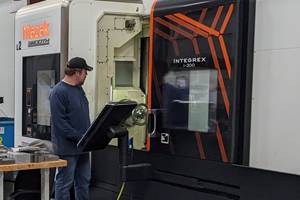Scales And DROs Customize Lathe To Keep Power Companies Running
When a multimillion-dollar turbine generator at a power plant needs to be repaired, time is of the essence. This company rehabilitates and rebuilds existing generators.
Share





When a multimillion-dollar turbine generator at a power plant needs to be repaired, time is of the essence. A company formed in 1999, ReGENco LLC (West Allis, Wisconsin), rehabilitates and rebuilds existing generators. With the growing demands of power companies for repair of aging large turbine generator parts throughout the United States, the company recently made the decision to add a large engine lathe—specially designed with multiple scales and DROs—to handle these jobs.
The company's Wagner-Dortmund engine lathe, which has been relocated from Germany, has been rebuilt with two carriages, has an 84-inch turning diameter and can accept pieces up to 40 feet in length. Multiple position feedback systems from Heidenhain Corporation have been added to this machine to enable it to accurately and quickly turn surfaces on shafts, rotors or even drums. A variety of equipment components from U.S. power plants is now being machined, such as generator rotors, collector rings, salient pole generators and turbine rotors of many different sizes and configurations.
"We needed to add a lathe that could handle the large, multimillion-dollar parts that come through here," explains Dion Bauer, ReGENco's director of project management. "It was an added bonus that we were able to configure the lathe in such a way as to make it uniquely adept at the components that we service."
The new lathe at ReGENco features dual carriages. Most lathes only have one carriage that is used to hold the cutting tools and travel along the lathe bedways, with one cross slide and one compound slide to provide movement and placement of those cutting tools. This particular lathe also has an additional slide on the top of each of the two compound slides (one per carriage, called the upper compound slides).
"Our Heidenhain contact worked with us to help us design this system with very high accuracy," says Dan Brandenburg, ReGENco project engineer, who explains that this lathe has a total of seven linear scales and two DROs mounted on it. "It was important that the linear encoding to be put on this lathe was the correct style for these two carriages. Considering the value of the parts that we work on here, we cannot afford to make any errors."
ReGENco opted to purchase the Heidenhain system for several reasons. The most important was the accuracy of the 12,080 mm/39-foot length scale for the bedway.
Another reason was that the Heidenhain Positip 855 DRO is a four-scale-input counter that is capable of only three scale inputs. The use of this DRO decreased the number of counters mounted per carriage from two to one. Both carriages have three slides simultaneously moving with the fourth bedway slide. Each slide has its own linear scale.
"We are always looking for ways to quicken cycle time," says ReGENco president John Bobrowich. "When a customer's piece of equipment is down for repair or maintenance, he doesn't want it down any longer than it has to be. Our new lathe, with its twin carriage design and its two toolholders, enables us to be working on two ends of a very large part simultaneously, quickly and accurately."
All seven scales are Heidenhain's sealed, incremental types. The six scales covering the two carriage slides are model LS303Cs and have accuracy grades of 10 mirconmeters. They are optical systems, rather than the magnetic scales ReGENco used in the past.
"We switched to the optical type for better accuracy, and were also happy with the fact that we can calibrate the optical tape right on the machine," Mr. Brandenburg says.
"Our new lathe has been running for months now and works really well. It's really been tested out because we've used it on a lot of different equipment, particularly on the turbine rotors where we've done seal work and machining of the shrouds that require really high accuracy. We've had no mistakes or downtime, even through some pretty complex work."
Related Content
Continuous Improvement and New Functionality Are the Name of the Game
Mastercam 2025 incorporates big advancements and small — all based on customer feedback and the company’s commitment to keeping its signature product best in class.
Read More5 Tips for Running a Profitable Aerospace Shop
Aerospace machining is a demanding and competitive sector of manufacturing, but this shop demonstrates five ways to find aerospace success.
Read MoreCan AI Replace Programmers? Writers Face a Similar Question
The answer is the same in both cases. Artificial intelligence performs sophisticated tasks, but falls short of delivering on the fullness of what the work entails.
Read MoreCutting Part Programming Times Through AI
CAM Assist cuts repetition from part programming — early users say it cuts tribal knowledge and could be a useful tool for training new programmers.
Read MoreRead Next
Setting Up the Building Blocks for a Digital Factory
Woodward Inc. spent over a year developing an API to connect machines to its digital factory. Caron Engineering’s MiConnect has cut most of this process while also granting the shop greater access to machine information.
Read MoreBuilding Out a Foundation for Student Machinists
Autodesk and Haas have teamed up to produce an introductory course for students that covers the basics of CAD, CAM and CNC while providing them with a portfolio part.
Read More5 Rules of Thumb for Buying CNC Machine Tools
Use these tips to carefully plan your machine tool purchases and to avoid regretting your decision later.
Read More















.jpg;maxWidth=300;quality=90)

















